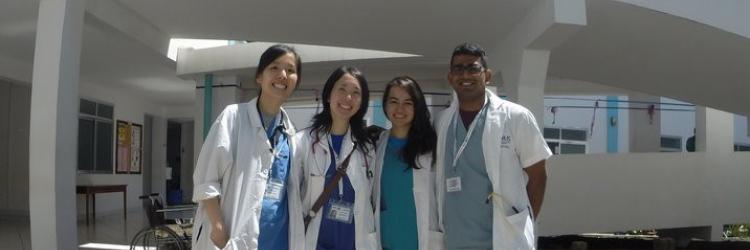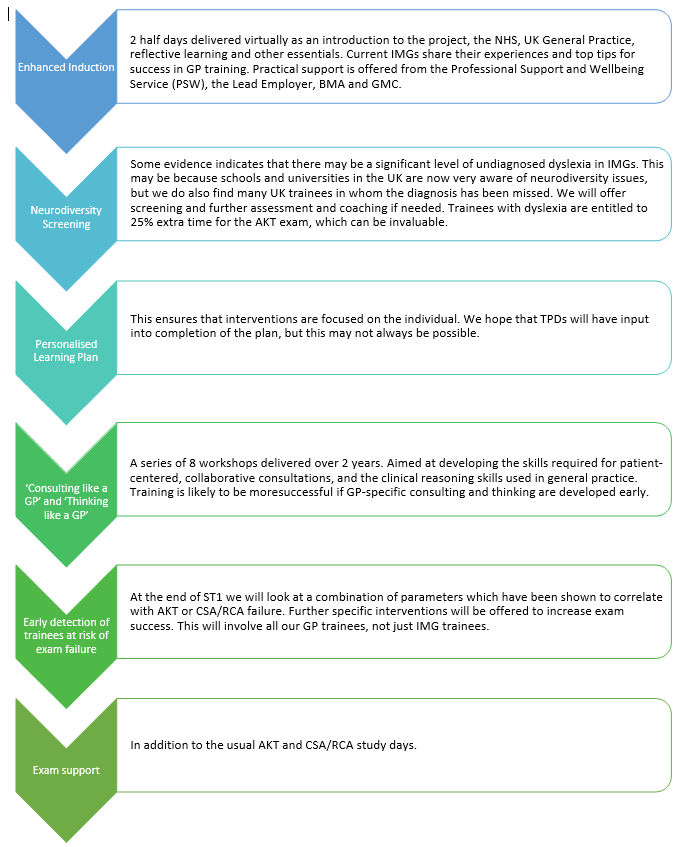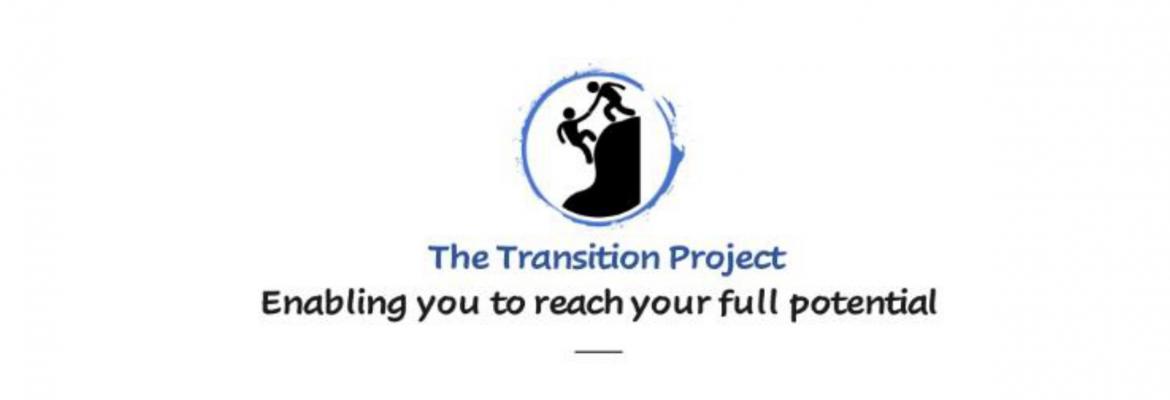

What is the Transition Project?
The full title is ‘The Transition into The Workforce Project’. The aim is to offer extra support to our International Medical Graduates (IMGs), to allow a smooth transition into GP training and into the GP workforce, hopefully in the East of England!
Please view the following 'Introduction to the Transition Project' video, please also see the 'IMG Handbook for East of England' at the bottom of this page which is designed to be part of an array of tools for you to use while you settle into your new life in the UK.
What are the project goals?
The purpose of the project is to make the East of England the best place to train as a GP.
We greatly value the diversity of our GP trainees and want everyone to have equal opportunity to pass their exams and assessments.
Who is it for?
Any GP trainee joining an NHSE EoE training program from February 2020, whose primary medical qualification was not in the UK. If you have already worked in the UK prior to GP training we would still very strongly encourage you to accept the support on offer.
Please see the following video which includes International Medical Graduate Trainees sharing their Training experiences in the East of England.
What does it involve?
We are putting together a holistic package of support which will start early in ST1:
All workshops and other interventions will be delivered virtually for the foreseeable future.

The Team and contact information
| Dr Sunil Gupta - Associate Dean for IMG Support | sunil.gupta8@nhs.net |
| NHS East of England Primary Care Team | england.primarycare.eoe@nhs.net |
The Transition Project (TP) is additional and complimentary to your normal training. It is also independent of the PSW support, though again our services are complimentary. You are encouraged to access PSW as well if needed.
The TP team will email you at least 6 weeks in advance of all sessions via england.primarycare.eoe@nhs.net, and the link to virtual training will be sent a few days before the session takes place.
ST1 - You need to attend Training Days 1, 2, 3, 4 in your first year
ST2 - You need to attend Training Days 5, 6, 7, 8 in your second year
For more details on when the 2025/26 Training Days will take place, please see here. There is a separate tab at the bottom of the calendar which outlines the content for each Training Day.
Booking links will be shared soon. Please make sure to book Study Leave in advance
Yes. You will need to request study leave according to your local policies for all training sessions. All training is free to you, so you will not need to request any funding.
We hope that won’t happen! We are offering you a bespoke package of education and support with the aim of allowing you to achieve your full potential in GP training, increasing exam success and facilitating you to become the best GP possible. Who would refuse that!!!
Please do! We have a team of very enthusiastic GP Fellows working with us and already one ST1 trainee. If you are interested in offering help, please talk to one of the TP team.
Statistics for many years show that as a group Drs who did not graduate in the UK find all 3 assessments in GP training (the 2 exams and work place based assessments) more challenging. This is not unique to GP training, it is seen in all medical training, and in other countries. The causes are very complex but are absolutely NOT about ability or any other deficiency. Some of the causes relate to working in a different culture, differences in learning and teaching, language and social language, separation from support networks and many others. In the East of England we greatly value cultural diversity and we are determined to work to reverse this trend. Smaller group differences are also seen in UK graduates from a BAME background, so if any BAME trainees want to benefit from this additional training please contact one of the project team.
We have put a great deal of time and funding into developing this holistic package of support. We very much hope you will enjoy it and benefit from it so that you do achieve your full potential. We would request that you:
- Ensure we have an up to date email address.
- Respond to emails promptly.
- Attend as much of the training as possible in order to gain the most benefit.
- Request study leave early for all training.
- Cancel in good time to allow someone else the opportunity to take your place if you are unable to attend any session you have booked
- Ensure you do any pre-course work required. You will be emailed with details if this is required.
- Fill in feedback after every training session. This is vital for us to be able to plan, and if necessary, improve future training.
- Enjoy being part of the Transitional Project community and help us to help you!
Please see the booking links for this years dates below:
Consulting and Thinking Like a GP
Consulting and Thinking Like a GP Sessions 5 & 6 (ST2 only) - 20th November 2025
Consulting and Thinking Like a GP Sessions 1 & 2 (ST1 only) - 9th December 2025
Consulting and Thinking Like a GP Sessions 5 & 6 (repeat) ST2 only - 13th January 2026
Consulting and Thinking Like a GP Sessions 1 & 2 (repeat) ST1 only - 12th February 2026
Consulting and Thinking Like a GP Sessions 7 & 8 (St2 only) - 6th March 2026
Consulting and Thinking Like a GP Sessions 3 & 4 (ST1 only) - 8th May 2026
Consulting and Thinking Like a GP Sessions 7 & 8 (repeat) ST2 only - 21st May 2026
Consulting and Thinking Like a GP Sessions 3 & 4 (repeat) ST1 only - 16th June 2026
SMARTLIFE
SMARTLIFE Sessions 5 & 6 (ST2 only) - 16th October 2025
SMARTLIFE Sessions 1 & 2 (Repeat) ST1 only - 11th November 2025
SMARTLIFE Sessions 3 & 4 (St1 only) - 15th January 2026
SMARTLIFE Sessions 5 & 6 (repeat) ST2 only - 30th January 2026
SMARTLIFE Sessions 3 & 4 (repeat) ST1 only - 20th March 2026
SMARTLIFE Sessions 7 & 8 (ST2 only) - 14th May 2026
SMARTLIFE Sessions 7 & 8 (repeat) ST2 only - 30th June 2026
Please only book on to one of the sessions if they are repeated.
**Please note, clicking the link does not register your place, clicking the register option and completing your details will finalise your place. Ensure that you are completing your registration on a laptop device, there appears to be issues with mobile device registration**
You will receive a MS Teams link for the specific date a week before, there will only be one link for the sessions as it is a whole day event.
- RCGP guide for overseas doctors on living and working in the UK as a GP
- Understanding UK General Practice – UK Primary Care YouTube videos from BMJ
- NHS.UK
- NHS Acronym Buster
- Culture and Professionalism- stories from International medical graduates of the early days working in the NHS
- Making the transition to working in the NHS health professionals from overseas tell their stories -more IMG reflections
- https://www.bma.org.uk/advice-and-support/international-doctors/getting-a-job-in-the-uk/working-in-the-uk-and-your-visa/applying-for-a-job-and-registering-with-gmc
- https://www.gmc-uk.org/registration-and-licensing/join-our-registers/before-you-apply
- https://www.fourteenfish.com/igprskype1 skype broadcasts recorded for GP’s new to the UK. Aimed at trained international GPs, to enhance their induction into general practice in UK health care but very useful.
- Patient centred consultation This short video is directed at Pharmacists consulting but is useful to help understand "the patient centred model" of consulting used in general practice
- https://www.bradfordvts.co.uk/communication-skills/teach-communication-skills/consultation-skills-evidence/ lots of information on consultation skills.
- https://patient.info/doctor/consultation-analysis#nav-4 some basics of the consultation including consultation models.
- https://www.healthtalk.org/ Thousands of short clips of patients talking about their experiences of living with different medical conditions. Easy to listen to small chunks of patient perspectives, with background information on the conditions and treatments.
- https://www.gp-update.co.uk/ The website used by lots of GPs for information on every condition. Great for descriptions and explanations at a patient level without jargon. Use this to look up conditions after seeing patients to learn explanations and treatment options from an early stage.
- https://www.bradfordvts.co.uk/wp-content/onlineresources/teaching-learning/international-medical-graduates/spend%20a%20penny%20and%20other%20things%20patients%20say%20-%20by%20jill%20choudhury.pdf explains lots of phrases, many odd things UK people say, how to explain things to patients etc (very good).
- https://geekymedics.com/ website for medical students but lots of easy to read information and ideas for explanations to patients.
- https://dermnetnz.org/ - pictures of every skin condition, information and treatment. Good for diagnoses and showing patients.
- http://www.pcds.org.uk/ - the PCDS website is a leading dermatology website with a comprehensive diagnostic resource and concise guidance on the management of skin conditions. Handy to have on the desktop when seeing patients.
- https://thedermreview.com/skin-cancer-awareness-prevention-for-people-of-color/ - This guide highlights skin cancer awareness and prevention for people of colour
- https://www.rcog.org.uk/en/guidelines-research-services/guidelines/?p=2 - The Royal College of Obstetrics and Gynaecology Green Top Guidelines. These are created for obstetricians and gynaecologists but can be useful to use even in GP. For training: Could be useful if considering doing DRCOG diploma; good resource to use during Obs&Gynae placements but also useful for GP placements (ie. You arrange a routine USS for a postmenopausal woman and find an ovarian cyst, to aid with the onward referral looking at this could help to know what is best practice:
- https://www.rcog.org.uk/globalassets/documents/guidelines/green-top-guidelines/gtg_34.pdf)
- https://bjgp.org/content/61/582/68 Tips for GP working in paedriatric
- https://www.piernetwork.org/guidelines.html Numerous guidelines on all things paediatric form infant feeding to chemotherapy and everything in between. Very useful.
- https://www.eoemskservice.nhs.uk/advice-and-leaflets - local NHS physiotherapy service with great leaflets providing exercises for patients to use. Good to get familiar with them as particularly useful to know how to explain the exercises to patients.
- https://about.medicinescomplete.com/ BNF and BNF for children. Free access for UK doctors including trainees.
- https://www.bradfordvts.co.uk/ A wealth of free resources, not just for Bradford VTS. An absolute must! It will have the answer to many training questions, and lots of resources for the exams. E.g. This link shows you the assessments and early essentials.https://www.bradfordvts.co.uk/wp-content/onlineresources/teaching-learning/induction/gp-scheme-induction/06%20gp%20training%20-%20what%20every%20trainee%20should%20know.pdf
- https://www.rcgp.org.uk/ Don’t forget your college website! It is a mine of information.
- https://www.gp-update.co.uk - the Red Whale group organise webinars and event days to summarise all useful updated guidance for primary care. Attending one of their event days is possible as a trainee. This then provides you with access to the online learning. Great resource for preparing AKT exam, especially the Cancer Referral criteria pathways (2WW rules).
- https://cks.nice.org.uk/#?char=A - Official NICE guidance for all conditions with diagnosis/investigations/management offered in well organised structure and with all evidence base used by NICE to formulate the up to date guidance on best practice. VERY USEFUL day-to-day in any placement as a trainee, but also long term as GPs.
- https://www.e-lfh.org.uk - all mandatory e-learning modules available are from this website.
- https://elearning.rcgp.org.uk/ RCGP e-learning. Free topical and relevant learning modules available to all trainees.
- https://new-learning.bmj.com/ BMJ online learning modules. This requires registration and subscription. Useful for examinations and clinical skills.
- https://www.gmc-uk.org/ethical-guidance/ethical-guidance-for-doctors/good-medical-practice Full set of Good Medical Practice GMC ethical guidance.
- https://www.gmc-uk.org/gmpinaction/ GMC Good medical practice in action. Test your knowledge of ethical guidance by visiting Good Medical Practice in action. You get to choose what the doctor should do in over 60 scenarios.
- https://www.gmc-uk.org/doctors/welcomeuklogin/Default.aspx Being a successful doctor in the UK is about more than clinical competence. You also need to know and apply the principles and values set out the core guidance Good Medical Practice. This on-line self-assessment will give you an insight into your level of knowledge and understanding of how the standards apply to your daily practice. This is an anonymous test, so only you will have a record of your results.
- https://www.gmc-uk.org/ethical-guidance/learning-materials a variety of topical issues for doctors in the UK for you to browse at your leisure.
